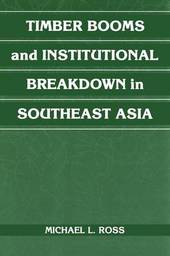
|
Timber Booms and Institutional Breakdown in Southeast Asia
Paperback / softback
Main Details
| Title |
Timber Booms and Institutional Breakdown in Southeast Asia
|
| Authors and Contributors |
By (author) Michael L. Ross
|
| Series | Political Economy of Institutions and Decisions |
|---|
| Physical Properties |
| Format:Paperback / softback | | Pages:256 | | Dimensions(mm): Height 229,Width 152 |
|
| Category/Genre | International trade
Political economy |
|---|
| ISBN/Barcode |
9781107404816
|
| Classifications | Dewey:333.751370959 |
|---|
| Audience | | Professional & Vocational | |
|---|
| Illustrations |
Worked examples or Exercises
|
|
Publishing Details |
| Publisher |
Cambridge University Press
|
| Imprint |
Cambridge University Press
|
| Publication Date |
19 July 2012 |
| Publication Country |
United Kingdom
|
Description
Scholars have long studied how institutions emerge and become stable. But why do institutions sometimes break down? In this book, Michael L. Ross explores the breakdown of the institutions that govern natural resource exports in developing states. He shows that these institutions often break down when states receive positive trade shocks - unanticipated windfalls. Drawing on the theory of rent-seeking, he suggests that these institutions succumb to a problem he calls 'rent-seizing' - the predatory behavior of politicians who seek to supply rent to others, and who purposefully dismantle institutions that restrain them. Using case studies of timber booms in Indonesia, Malaysia and the Philippines, he shows how windfalls tend to trigger rent-seizing activities that may have disastrous consequences for state institutions, and for the government of natural resources. More generally, he shows how institutions can collapse when they have become endogenous to any rent-seeking process.
Reviews'... this book is a must-read for anyone seriously interested in improving his understanding of the nexus between politics and the economics of natural resources, including, but not restricted to, forests. For that matter, it's a must-read for anyone interested in the economic development of countries whose economics are based substantially on exports of natural resources.' David N. Laband, School of Forestry and Wildlife Sciences, Auburn University, USA 'This book provides an excellent and original analysis of the pressing issue of state resource mismanagement.' Raymond Bryant, King's College London ' ... strongly recommended to anyone interested in Asian forests, natural resources management or governance problems in developing countries.' Journal of the Humanities and Social Sciences of Southeast Asia and Oceania 'This book offers a clear understanding of how natural-resource management in developing countries cannot be managed solely on a political basis, but must involve responsible and ethical foresters.' The Journal of Asian Studies
|